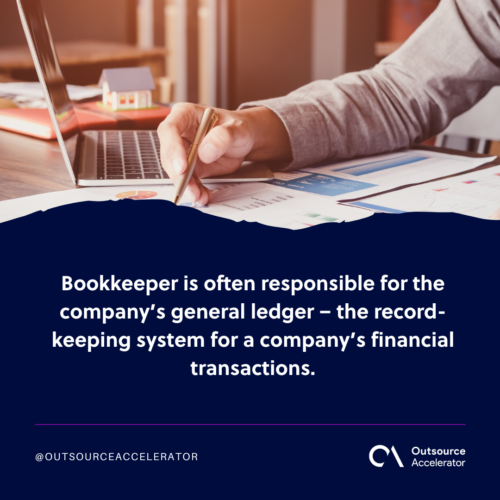Hire a bookkeeper for your business

As a small business grows and carefully expands its operations, the more it realizes the need to delegate other important responsibilities to new hires. It may mean outsourcing a staffing firm in order to expand offshore, hiring a new virtual assistant to help with the repetitive tasks, or getting another operations manager to oversee day-to-day business activities.
Further, it could also mean hiring a bookkeeper to keep track of and record the business’ financial transactions. As the company gets bigger, more people are needed in order to perform this task more efficiently.
Bookkeepers’ main responsibilities
The bookkeeper’s role will always depend on the varying size of the company as well as its nature of business. With small companies, bookkeepers will most likely have more elaborate and extensive responsibilities. In a more general sense though, here are the main duties of a bookkeeper:
Payroll processing
From tracking the missing hours, holiday and overtime payments, leave taken without pay, and tax deductions, bookkeepers can help with the time-consuming task of payroll processing.
Preparing financial statements
Bookkeepers are responsible for preparing the company’s financial statements, balance sheets, cash flow statements, and more. Additionally, they can review your source documents and post entries into your accounting software.
Recording all transactions
The bookkeeper is often responsible for the company’s general ledger – the record-keeping system for a company’s financial transactions.
As mentioned above, they produce financial statements and other reports for the company’s leaders. They also work with the following records:
- Receipts
- Accounts payable
- Accounts receivable
- Expenditure
- Profit
- Loss
- Review records
There’s no space for mistakes in this line of work, so bookkeepers are also tasked to double-check records to ensure that the records match.
Further, some entry-level bookkeepers still learning the ropes are also tasked to monitor loans to make sure that payments are up-to-date; and are made to take note of huge errors for accountants to resolve.

Bookkeepers vs accountants
One understandable confusion that comes with the topic of bookkeeping is differentiating what bookkeepers and accountants do. Bookkeepers fit well with small businesses, as they can handle the responsibilities that come with working in one. However, for medium-sized companies or huge corporations, they will need to seek the help of licensed accountants.
| Bookkeepers | Accountants |
| Only required to have any business or finance degree | Required to have an accounting degree and Certified Public Accountant (CPA) license |
| Record daily financial transactions, debits, and credits; produces invoices | Verify and analyze data recorded by the bookkeeper |
| Focused on the day-to-day affairs | Focused on the big picture |
| Cannot be considered an accountant without proper license/certification | Can be considered a bookkeeper |
Scope of responsibility
Bookkeepers are in charge of the day-to-day work; they keep the accounts detailed and concise. They also record credit card activity into QuickBooks and update owners on accounts receivable.
Accountants, on the other hand, will take a look at the created accounts and records on a quarterly basis. They’ll double-check, make minor revisions or adjustments (if needed) and file official reports.
College degree
Bookkeepers are only required to have a business or finance degree, while accountants are required to have an accounting degree and Certified Public Accountant (CPA) license.
Daily tasks and responsibilities
Bookkeepers record daily financial transactions, debits, and credits; produce invoices, focus on day-to-day affairs. While accountants verify and analyze data recorded by the bookkeeper.
Small businesses can do well with only hiring or outsourcing a bookkeeper. However, for bigger businesses, it is ideal that they hire both people for better record-keeping and smoother business and accounting operations.
Why hire a bookkeeper for your business
Bookkeepers from premier solutions providers like Boomering are very reliable when it comes to making sure that your business is making more money than it’s losing. They provide an extra pair of eyes when it comes to taking care of your funds and ensuring that you don’t run out of day-to-day money.
In addition, you can also seek your bookkeeper’s opinions when thinking of whether it’s a good idea to invest, expand, or get a loan for the business. Here are some of the reasons why you should hire a bookkeeper for your business.
Separate checkbook
Hiring a dedicated bookkeeper means that a separate checkbook will be created for your business for it to be considered as its own entity. Having your checkbooks separated from bank accounts has a lot of benefits, which include tax savings, organized books, and improved decision-making.
This is especially a significant perk for those who are just starting out with their small businesses. It’s much better to learn the ropes in a more organized and smooth manner, than just try to wing everything or leave them up to chance.

Reduced accounting costs
Small businesses can keep their books organized and secure at a cost-effective price by hiring a bookkeeper instead of an accountant for their day-to-day transactions.
Save on taxes
Bookkeepers can not only help you keep better records, they can also ultimately help to improve your tax return. With them, taxes will be a breeze, and you will have a dependable helping hand to avoid audit expenses and inadequate records.
Finding the right bookkeeper for your business
It is important not to rush when hiring a bookkeeper, since they will play a significant role in the growth and development of your small business. They’ll work with your records and with the money that comes and goes out of your business, so you should invest time and great effort in order to find someone you can truly trust.
Some of the basic qualities of an efficient bookkeeper would be the following:
Good industry knowledge
Some sectors may require different records or requirements than others, so you should look for a bookkeeper with a great amount of knowledge on your industry. Prior experience with a company like yours would also be ideal.
Well-organized
You need a bookkeeper to handle your records and books, and of course, we need them to be very well-organized and equipped with the necessary administrative skills.
Dependable
Reliability and dependability are two traits that should be non-negotiables when hiring a bookkeeper. If you can, check their character references to ensure that the person is a hard worker who won’t leave you hanging.
Hire a bookkeeper
Like reiterated above, a bookkeeper is an important part of your team. Once you’ve completed your list of requirements (experience- and skills-wise), it’s now time to think of where to find your bookkeeper.
You have so many options to choose from.
Do you like to directly hire your bookkeeper and have them work in your office, or hire one from a staffing agency in your area? Do you like to directly hire someone but have them work remotely wherever they want, or would you like to hire a bookkeeper provided by a trusted offshore outsourcing provider?
Modern technology has allowed us to try non-conventional ways of hiring new staff. The past several years have introduced us to the world of outsourcing: its solutions, advantages, disadvantages, effectiveness, and more.
There is a great misconception regarding the industry – people thinking that outsourcing is only for call centers and customer support services – however, little do they know that you can outsource almost everything successfully!
Ranging from social media management and graphic design to architecture, telehealthcare, and bookkeeping, outsourcing staff has been proven to be an efficient and cost-effective solution for small and large businesses alike.

Online job platforms
Online job platforms like Freelancer, Onlinejobs, and Upwork have become pretty popular especially during this time where professionals of different industries and backgrounds are either laid off from work or are looking for new remote opportunities.
These platforms promise convenience and access to a wide pool of talented and dedicated remote professionals looking to get hired. With these platforms, the general steps you need to do by yourself include the following:
- Create a Freelancer/OnlineJobs/Upwork account;
- Post a job listing (be as specific as possible in order to weed out the unqualified potential candidates);
- Wait for applicants to submit their proposals;
- Conduct assessments and interviews;
- Choose who to hire;
- Sign a contract with the chosen employee;
- Start working.
These steps can require a good amount of time and effort, and if you’re a small business owner with a tight daily schedule, it may be difficult to fit all these in. However, if you’re someone who’s very hands on and would like to get to know your new hire personally, this can be a very good option.
Here are the other pros and cons of outsourcing through online job platforms:
| Pros | Cons |
| Secure and convenient platform | Extra charges (You have to pay these platforms on top of the employee’s salary) |
| Access to a wide and diverse pool of professionals | There’s possibility of being scammed |
| The employee will be working directly under you | The hiring process will take too much of your time and energy |
| Hands-on experience in the hiring process (if that’s your thing) | Having to personally weed out bogus/unqualified candidates is already a job in itself |
Outsourcing bookkeepers to BPO firms
Seeking the services of Business Process Outsourcing or BPO companies would be a convenient way to outsource your new bookkeeper. Like online hiring platforms, BPO companies can also connect you with a talented pool of qualified professionals looking to get hired.
However, you won’t need to spend as much time and effort because these firms have expert recruiters who will do the hard work for you.
Different BPO companies have different markets; some specialize in small to medium-sized businesses while others cater to the needs of large corporations.
When looking for an outsourcing provider, you’ll need to do your research to find out the company that is most suitable for your business needs – whether you’re looking for a single bookkeeper or a team of accountants to add to your team.
| Pros | Cons |
| Companies can save up to 70% on overhead costs | Occasional problems with the internet infrastructure |
| Scalable and cost-effective solutions (especially compared to direct hiring) | Data privacy concerns |
| Less matters to worry about (like taxes, benefits, etc.) | Less direct communication with the employees |
| Access to a talented and dedicated global workforce | Time zone differences and cultural barrier |
| Simpler and more convenient onboarding process |
Hiring a new bookkeeper – or any other employee for that matter – doesn’t have to be a complicated process. Traditional ways of onboarding are effective, but we also have to consider our newer ways of hiring new employees in order to create a much better and more informed decision. Take your time, do your research, and choose wisely.
Partnering with a reputable BPO provider like DOXA will ensure that your outsourcing venture will go as smoothly as possible.
If you are looking to consider outsourcing, feel free to check out Outsource Accelerator’s Outsourcing Directory, where we have listed over 700 BPO companies for you to get the best terms, at the best prices. You may also get a free quote to get you started.







 Independent
Independent




